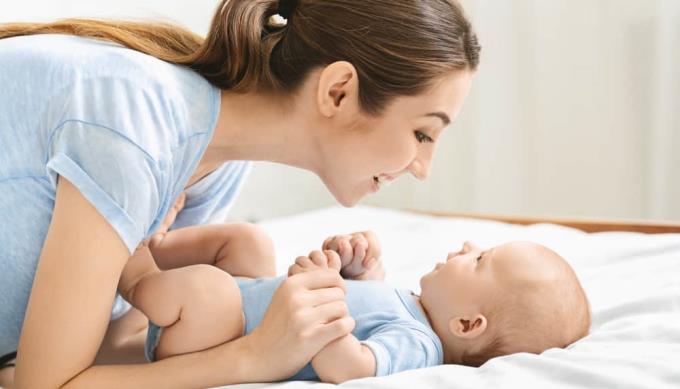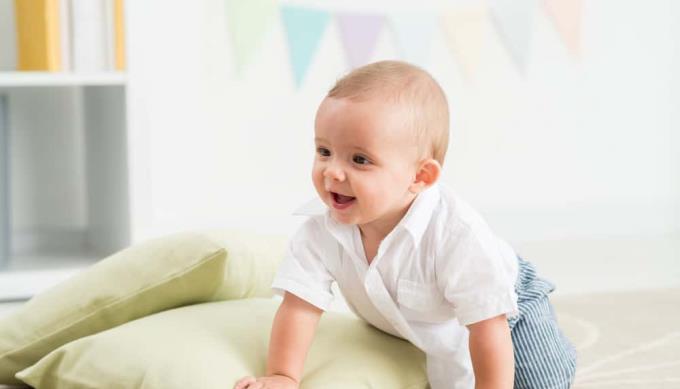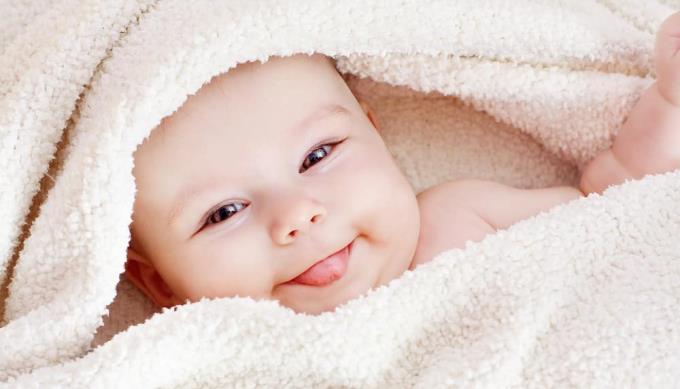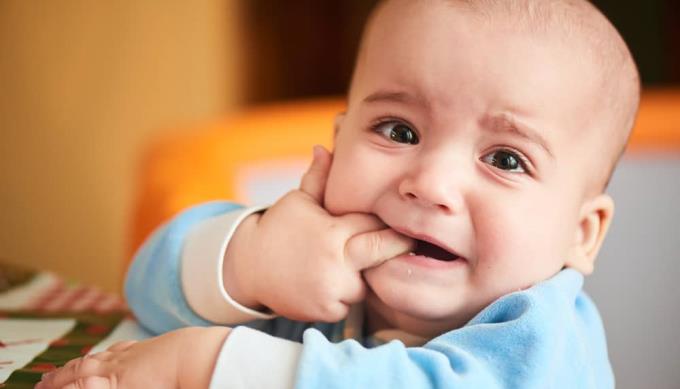Ways to determine an infants caloric needs

Learn how to determine your baby’s caloric needs, including the calories in breast milk and formula, to ensure your infant gets the right nutrition for healthy growth.
You are happy to see the first time your baby lifts his head up when lying on his tummy, then flips, crawls, crawls and toddlers ... There are 16 milestones for your child's development in the first year that you can't ignore.
Developmental milestones are important indicators for evaluating your baby's growth. As a parent, you should carefully watch to not miss any development of your baby. In addition, you should also know these milestones for better care and parenting.
Developmental milestones are essential achievements that babies must achieve in order to develop healthy and timely. These milestones are categorized into several groups: cognitive, physical, social, and emotional development. Most major milestones take place in the first year.
At the end of the first month of life, one of the key milestones in a baby's development is the ability to try to lift the head a little when placed on the tummy.
By the end of the second month, your baby can lift his head up to 45 ° and put his hand under his belly when placed on his stomach.
Your baby can keep his head steady at the end of the fourth month. At this time, the baby has raised the head 90 ° when lying on his stomach and control head movements better.
By the 6th month, the baby has almost full control of his head and can turn around and around to observe everything around. In addition, the baby can lift the head, chest and abdomen off the plane with just two hands slightly together and in this position, the baby can lift his head to look forward, he also tries to use one hand to lift. people.
By the end of the 7th month, the baby has complete control of his head and turns his head to the sides easily.

The second month, the baby starts making sounds.
At the end of the third month, the baby begins to babble and gurgle due to the development of the vocal cords. By the fourth month, babies begin to practice saying simple syllables like "Ah", "Eh", "Oh" ...
By the end of the 6th month, babies begin to string together vowels like "Aaoo" or "Eeaa". This is also true of consonants such as "Mh", "Dh" and "Bh".
At the end of the 8th month, your baby starts to say "baba" but still doesn't understand its meaning. So everyone will call it a baba.
At the end of the ninth month, the baby has been imitating some words even though his pronunciation is still lisp. By 1 year, the baby can say "mother", "daddy" and some other simple words like "no", "go" ...
At 4 months old, many babies know how to turn over from tummy to face and vice versa.
By the 6th month, you will see your baby do continuous rolling circles, which is how your baby moves from place to place. At this time, the baby's abdominal muscles are strong enough for this activity.
By the end of the second month, your baby can keep his body in a sitting position with support. By the end of the 4th month, the baby will be able to sit up straight with support because the neck muscles of the baby have developed strong enough to raise their head.
By the 6th month, the baby can sit without support. By 9 months, the baby can sit alone and sit for a long time from 7-10 minutes.
After 10 months, babies can switch from tummy to sitting and by 1 year they can switch from standing to sitting.

At the end of the second month, the baby has lifted its head and knows how to lift the chest with arms, hands and wrists. These skills are the precursors to crawling and crawling.
Baby starts to crawl from 7 - 9 months. However, this skill is perfect by the end of the ninth month. Crawling helps your baby's muscles become strong to stand up and walk.
When the baby is 3 months old, if you keep the baby upright, the baby's legs will be partially under pressure and the baby will usually pull their legs up.
4 months, babies begin to push their feet to the ground when placed on a certain surface. After 6 months, the baby will be able to stand up and jump with support.
By the end of the ninth month, many babies will grab themselves on the fixture and get up and stand still.
10 - 11 months many babies have cling to objects by themselves step by step.
1 year old, the baby gets up on its own without assistance. However, when standing, the baby tries not to hold and take a few small steps by himself.
Once standing, the baby will practice walking. By the end of November, the baby will walk on its own if supported.
After 1 year, your baby will try to take the first steps alone and this will be the most important milestone of your baby's development in the first year.

You will see your baby's first smile in the second month. Three months later, he can smile at his parents and others.
As your baby gets a little older, he or she will laugh in some situations such as seeing a loved one, seeing a favorite toy, a bottle of milk or simply seeing someone do something funny.
Infants can hear and therefore feel calm when they hear their parents' voices.
Two months old, babies already know how to turn their head towards the source of sounds, even though their movements are inaccurate or just approximate.
By the end of the third month, your baby can determine where the sounds are coming from.
At 6 months of age, babies not only recognize the source of the sound, but also react to that sound. This is an important development of your baby. By 9 months, the baby's brain begins to process sounds better, babies can imitate the sounds and noises they hear.
After 12 months, your baby's hearing has gradually improved. Now, the baby has recognized the characteristics of certain sounds and identified the voices of loved ones.
Babies often don't see clearly at birth and their eyes can't focus on an object. Bright, vibrant colors, clear shapes and large objects will draw your baby's attention more.
Your baby will see your face clearly by the end of the first month. Brightly colored objects about 3 steps away still make the baby excited.
During the first two months, your baby's eyeballs are still not in the correct position, making you feel like your baby is pulled. By the end of the 2nd month, the baby has begun to note the object along the vertical axis, the rotation axis and gradually pay attention to the face.
By the end of the third month, the baby has coordination between hands and eyes.
In the 4th month, the baby's eyes are gradually perfect, he can see further and see 3 dimensions better.
5 months, the baby's foresight becomes better, he begins to recognize a familiar face. At this time, babies can smile when they see acquaintances or favorite toys.
Your baby's color vision has developed as an adult.
After 6 months, the baby begins to explore the world around them. Therefore, your baby will learn how to coordinate hands and eyes. At the end of the 9th month, the baby knows how to determine the distance. Hand-eye coordination is better when babies can crawl. This is also the period where babies like games like peek-a-boo.
After one year, babies begin to see the world as adults. 1 year old, the baby detects colors, determines the distance and tracks a moving object.

In the first 2 months, the number of hours babies sleep during the day will be the same as at night. For example, infants under 1 month usually sleep for a total of 16 hours, equally divided between day and night.
By 6 months, the number of hours sleeping during the day will be reduced to only 4 hours and the number of hours of sleep at night is from 8 - 9 hours.
When the baby was 1 year old, he slept only 3 hours during the day, and increased to 11 hours at night.
When you touch your baby's finger on the baby's palm, the baby will clasp the hand. This is called the fist reflex. Your baby's toes and soles of his feet also have this reflex and will disappear after 6 months of age.
At 6 months old, babies begin to have reflexes with their hands. Your baby can now grasp an object from a flat surface with all of his fingers.
By the end of the 7th month, babies can use their thumb and index fingers to gently grip small objects.
Holding skills will fully develop by the time the baby is 9 months old. At this time, the baby knows how to use both the index finger and thumb to hold small objects. This is also the time when you should let your baby practice impetuous food.
By 12 months, babies can hold more tightly, they know how to hold objects with their thumb and fingers.
Babies often eat liquid foods because their digestive systems are still not fully developed. By 6 months, this is the time when you should practice feeding your baby solid foods.
After 7 months, your baby has begun to move his jaw muscles to chew food and to close his mouth when being fed with a spoon.
At 8 months, your baby can eat slightly stiffer foods.
9 months, baby knows how to hold food between thumb and index finger. This is the time when you should practice feeding your baby.
The older your baby gets, the nausea reflex will fade. This is naturally a child's instinct when a foreign object touches the back of the tongue or throat. In addition, when your baby grows up, he or she also has better control over tongue, jaw chewing and ability to open mouth when fed with a spoon.
At 1 year old, babies can easily pick up food with their fingers. At this point, you can start feeding your baby eggs and milk.

The first tooth to appear is the two incisors in the lower jaw when the baby is 7-8 months old.
The incisors in the upper jaw will grow when the baby is 9-10 months old.
The other teeth in the lower jaw will grow between 11-12 months, while the upper teeth will grow from 12-13 months.
When your baby is nearly 1 year old, he or she will have 8 teeth: 4 front teeth and 4 teeth next to the front teeth in both the upper and lower jaw.
2 months old, babies begin to know how to observe the world around them, including objects and people.
An important cognitive milestone occurs when your baby is 4 months old. Babies begin to understand the cause and effect. Your baby will try different actions to observe the results of these actions and observe the reaction of the caregiver.
By 6 months, babies begin to be curious about everything and know how to hold objects for examination. This is also the time when babies begin to get used to the names of objects.
After 7 months, your baby will understand that the object will not disappear when hidden under other objects. Thus, the baby began to enjoy hide and seek activities.
An 8 month old baby will focus attention for about 3 minutes but be curious about the many things he sees around.
9 months, the baby started to imitate gestures. This is an important milestone for intellectual development in the first year. By the end of the 10th month, your baby will be smarter. For example, if you hide something in front of the baby, the baby will crawl and find it.
Until 1 year old, your baby will know clearly the names and characteristics of some objects around. Your baby will know that the phone is placed on the ear and the comb is used to brush the hair. Besides, babies also begin to learn new skills by observing parents and caregivers.
Infants perceive familiar people as parents. When a baby cries, if he hears her parents or is cuddled by them, she stops crying.
At the end of the second month, the baby understands that parents are caregivers. Your baby will smile at people familiar with him such as grandparents, siblings ...
4 months old, babies will enjoy playing with people, smiling and crying when hungry, tired or in pain.
By 6 months, the baby remembers the faces of loved ones and begins to feel uncomfortable seeing strangers. This is also the age when babies have strange behaviors like being shy, irritable or friendly.
At 8 months of age, babies understand that parents bring them warm and safe feelings. That is why babies often cry a lot when they cannot see their parents. Your baby will feel uncomfortable when being hugged by a stranger. However, the baby will still be friendly to those who regularly play with them.
Remember, a child's developmental stages are often not the same for each individual. So, you need to be patient. Games play an important role in helping your baby reach important developmental milestones at the right time. Playing, interacting and communicating will help your baby develop better.
Learn how to determine your baby’s caloric needs, including the calories in breast milk and formula, to ensure your infant gets the right nutrition for healthy growth.
Discover the top 5 smartest dog breeds in the world, including Border Collie, Poodle, German Shepherd, Golden Retriever, and Doberman Pinscher. Learn about their unique traits and why they are considered the most intelligent dogs.
Discover 7 nutritious and delicious ways to cook egg porridge for babies, including recipes with cheese, pumpkin, tomato, and more. Learn how to prepare baby-friendly egg porridge with our expert tips.
After a series of medical measures they obtained a complete human vascular system profile.
Watermelon is one of the fruits that many people love, not only cheap but also delicious, nutritious and refreshing in the summer. To get delicious watermelon pieces, show off your housewives, your artistic talents to cut beautiful pieces of watermelon.
aFamilyToday Health - The digestive system and body in each baby is different. Parents need to recognize notes to deal with when babies have a food allergy!
Babies need many factors for perfect development. aFamilyToday Health shares with parents things to keep in mind when babies are 8 weeks old so that parents can take care of their babies the best!
Babies need many factors for perfect development. aFamilyToday Health shares with parents things to keep in mind when babies are 18 weeks so that parents can take care of their babies the best!
Babies need many factors for perfect development. aFamilyToday Health shares with parents things to keep in mind when babies are 28 weeks old so that parents can take care of their babies the best!
Babies need many factors for perfect development. aFamilyToday Health shares with parents things to keep in mind when babies are 32 weeks old so that parents can take care of their babies the best!








